Strategic Finance: Unilever's Foreign Direct Investment Motives
VerifiedAdded on 2023/01/03
|5
|994
|27
AI Summary
This study explores the foreign direct investment motives of Unilever, a global consumer products company, in the context of strategic finance. It discusses the justification of company choice, key corporate and financial objectives, and the discussion of foreign direct investment motives for Unilever. The study also covers risk variables in FDI, capital budgeting methods, and project evaluation techniques.
Contribute Materials
Your contribution can guide someone’s learning journey. Share your
documents today.
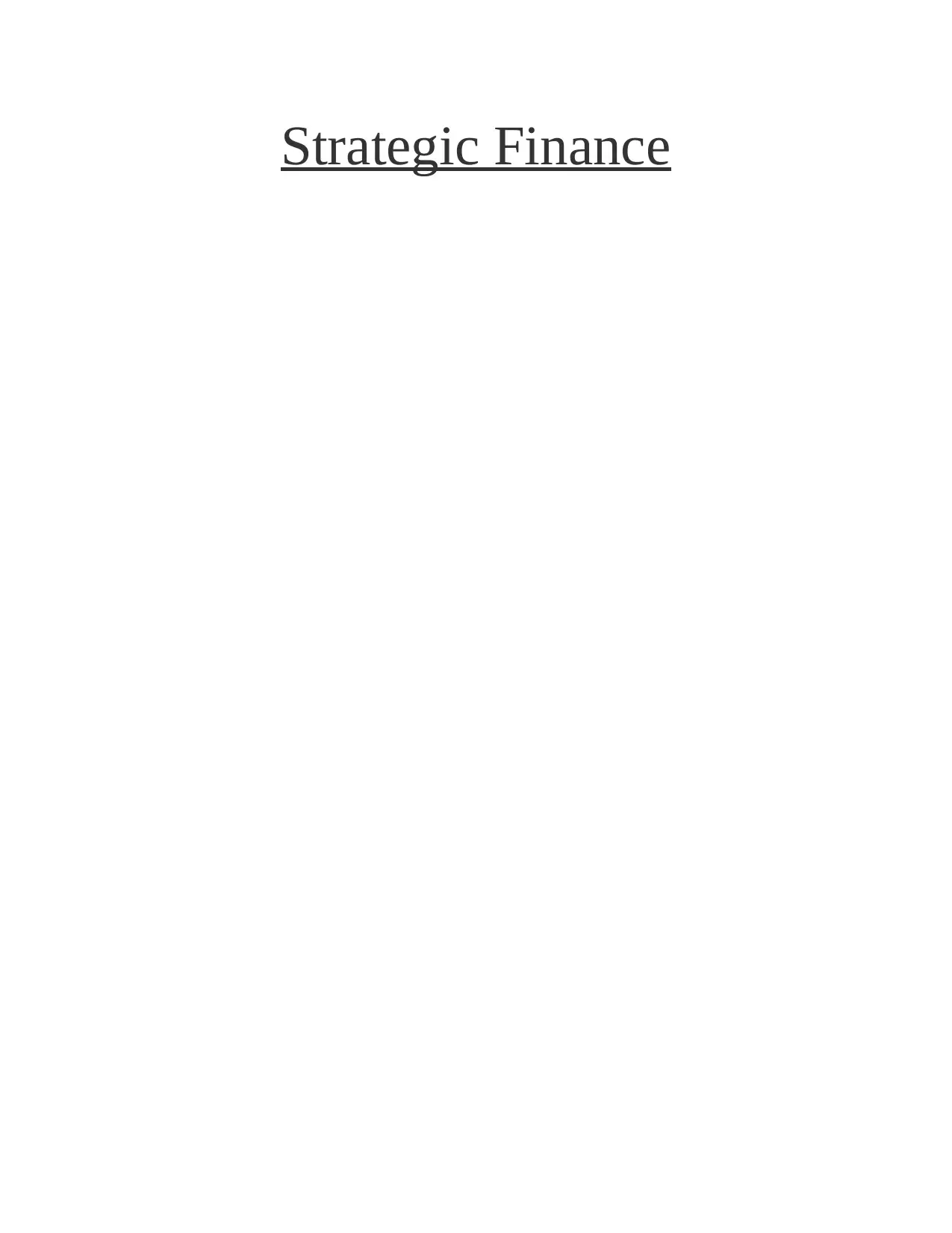
Strategic Finance
Secure Best Marks with AI Grader
Need help grading? Try our AI Grader for instant feedback on your assignments.
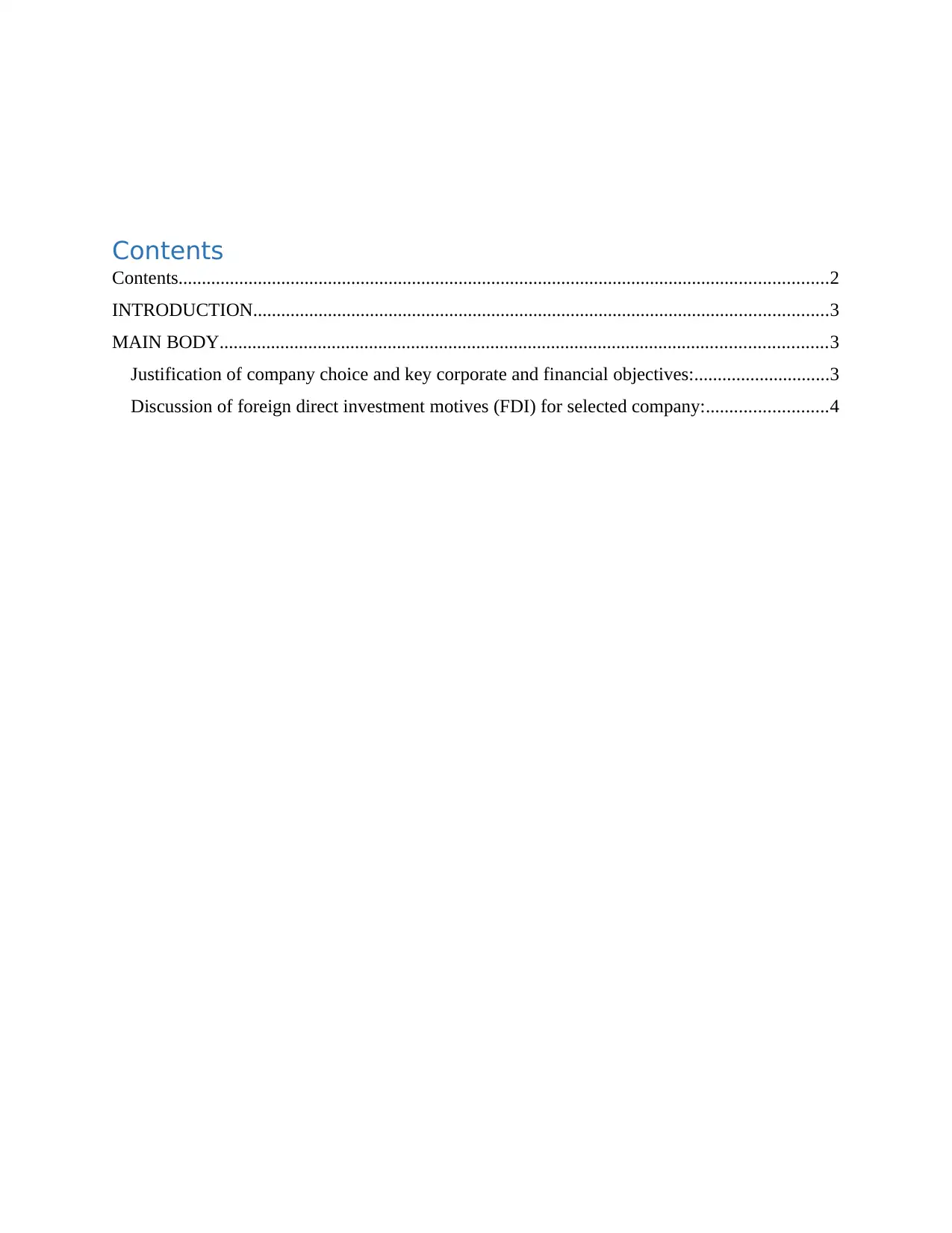
Contents
Contents...........................................................................................................................................2
INTRODUCTION...........................................................................................................................3
MAIN BODY..................................................................................................................................3
Justification of company choice and key corporate and financial objectives:.............................3
Discussion of foreign direct investment motives (FDI) for selected company:..........................4
Contents...........................................................................................................................................2
INTRODUCTION...........................................................................................................................3
MAIN BODY..................................................................................................................................3
Justification of company choice and key corporate and financial objectives:.............................3
Discussion of foreign direct investment motives (FDI) for selected company:..........................4
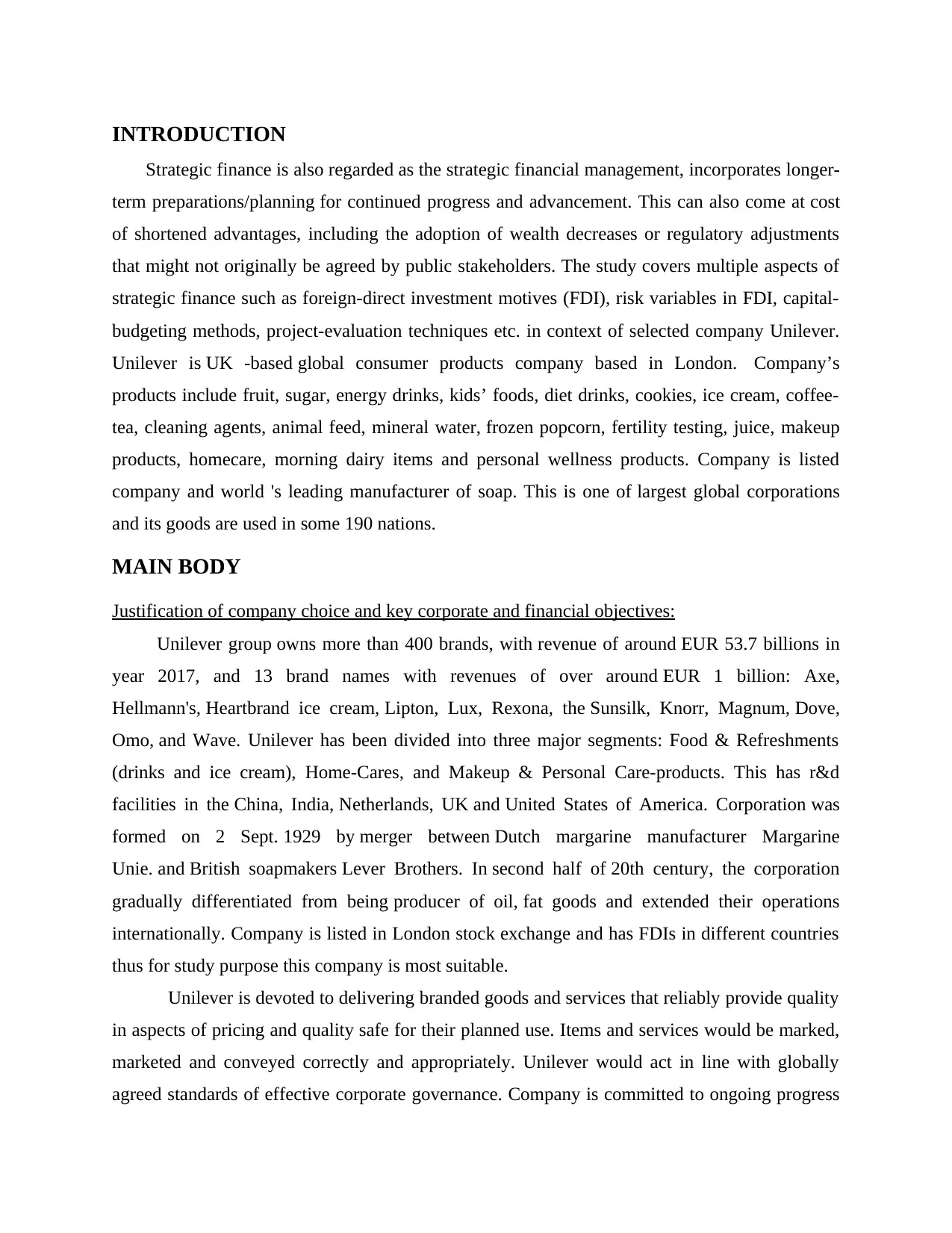
INTRODUCTION
Strategic finance is also regarded as the strategic financial management, incorporates longer-
term preparations/planning for continued progress and advancement. This can also come at cost
of shortened advantages, including the adoption of wealth decreases or regulatory adjustments
that might not originally be agreed by public stakeholders. The study covers multiple aspects of
strategic finance such as foreign-direct investment motives (FDI), risk variables in FDI, capital-
budgeting methods, project-evaluation techniques etc. in context of selected company Unilever.
Unilever is UK -based global consumer products company based in London. Company’s
products include fruit, sugar, energy drinks, kids’ foods, diet drinks, cookies, ice cream, coffee-
tea, cleaning agents, animal feed, mineral water, frozen popcorn, fertility testing, juice, makeup
products, homecare, morning dairy items and personal wellness products. Company is listed
company and world 's leading manufacturer of soap. This is one of largest global corporations
and its goods are used in some 190 nations.
MAIN BODY
Justification of company choice and key corporate and financial objectives:
Unilever group owns more than 400 brands, with revenue of around EUR 53.7 billions in
year 2017, and 13 brand names with revenues of over around EUR 1 billion: Axe,
Hellmann's, Heartbrand ice cream, Lipton, Lux, Rexona, the Sunsilk, Knorr, Magnum, Dove,
Omo, and Wave. Unilever has been divided into three major segments: Food & Refreshments
(drinks and ice cream), Home-Cares, and Makeup & Personal Care-products. This has r&d
facilities in the China, India, Netherlands, UK and United States of America. Corporation was
formed on 2 Sept. 1929 by merger between Dutch margarine manufacturer Margarine
Unie. and British soapmakers Lever Brothers. In second half of 20th century, the corporation
gradually differentiated from being producer of oil, fat goods and extended their operations
internationally. Company is listed in London stock exchange and has FDIs in different countries
thus for study purpose this company is most suitable.
Unilever is devoted to delivering branded goods and services that reliably provide quality
in aspects of pricing and quality safe for their planned use. Items and services would be marked,
marketed and conveyed correctly and appropriately. Unilever would act in line with globally
agreed standards of effective corporate governance. Company is committed to ongoing progress
Strategic finance is also regarded as the strategic financial management, incorporates longer-
term preparations/planning for continued progress and advancement. This can also come at cost
of shortened advantages, including the adoption of wealth decreases or regulatory adjustments
that might not originally be agreed by public stakeholders. The study covers multiple aspects of
strategic finance such as foreign-direct investment motives (FDI), risk variables in FDI, capital-
budgeting methods, project-evaluation techniques etc. in context of selected company Unilever.
Unilever is UK -based global consumer products company based in London. Company’s
products include fruit, sugar, energy drinks, kids’ foods, diet drinks, cookies, ice cream, coffee-
tea, cleaning agents, animal feed, mineral water, frozen popcorn, fertility testing, juice, makeup
products, homecare, morning dairy items and personal wellness products. Company is listed
company and world 's leading manufacturer of soap. This is one of largest global corporations
and its goods are used in some 190 nations.
MAIN BODY
Justification of company choice and key corporate and financial objectives:
Unilever group owns more than 400 brands, with revenue of around EUR 53.7 billions in
year 2017, and 13 brand names with revenues of over around EUR 1 billion: Axe,
Hellmann's, Heartbrand ice cream, Lipton, Lux, Rexona, the Sunsilk, Knorr, Magnum, Dove,
Omo, and Wave. Unilever has been divided into three major segments: Food & Refreshments
(drinks and ice cream), Home-Cares, and Makeup & Personal Care-products. This has r&d
facilities in the China, India, Netherlands, UK and United States of America. Corporation was
formed on 2 Sept. 1929 by merger between Dutch margarine manufacturer Margarine
Unie. and British soapmakers Lever Brothers. In second half of 20th century, the corporation
gradually differentiated from being producer of oil, fat goods and extended their operations
internationally. Company is listed in London stock exchange and has FDIs in different countries
thus for study purpose this company is most suitable.
Unilever is devoted to delivering branded goods and services that reliably provide quality
in aspects of pricing and quality safe for their planned use. Items and services would be marked,
marketed and conveyed correctly and appropriately. Unilever would act in line with globally
agreed standards of effective corporate governance. Company is committed to ongoing progress
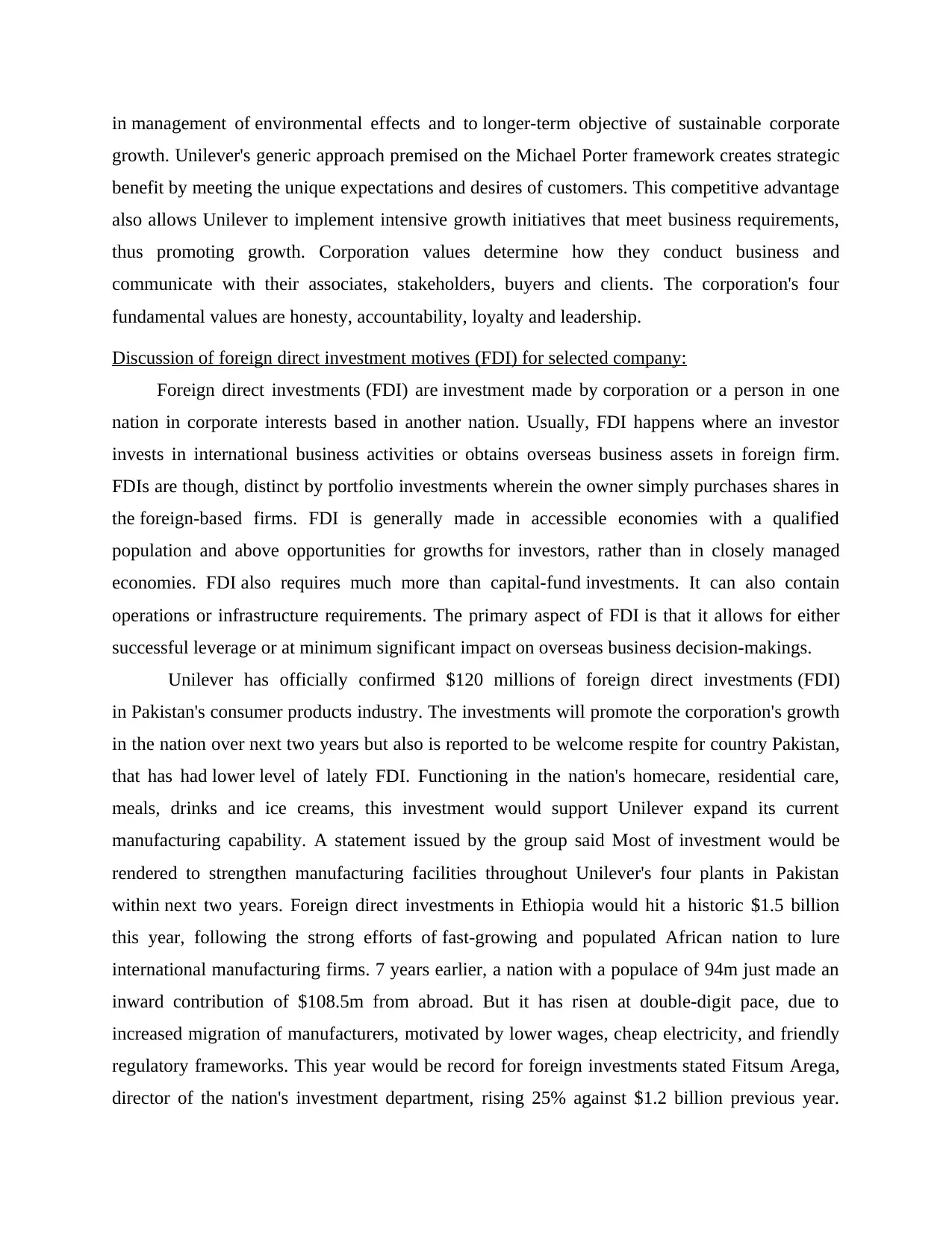
in management of environmental effects and to longer-term objective of sustainable corporate
growth. Unilever's generic approach premised on the Michael Porter framework creates strategic
benefit by meeting the unique expectations and desires of customers. This competitive advantage
also allows Unilever to implement intensive growth initiatives that meet business requirements,
thus promoting growth. Corporation values determine how they conduct business and
communicate with their associates, stakeholders, buyers and clients. The corporation's four
fundamental values are honesty, accountability, loyalty and leadership.
Discussion of foreign direct investment motives (FDI) for selected company:
Foreign direct investments (FDI) are investment made by corporation or a person in one
nation in corporate interests based in another nation. Usually, FDI happens where an investor
invests in international business activities or obtains overseas business assets in foreign firm.
FDIs are though, distinct by portfolio investments wherein the owner simply purchases shares in
the foreign-based firms. FDI is generally made in accessible economies with a qualified
population and above opportunities for growths for investors, rather than in closely managed
economies. FDI also requires much more than capital-fund investments. It can also contain
operations or infrastructure requirements. The primary aspect of FDI is that it allows for either
successful leverage or at minimum significant impact on overseas business decision-makings.
Unilever has officially confirmed $120 millions of foreign direct investments (FDI)
in Pakistan's consumer products industry. The investments will promote the corporation's growth
in the nation over next two years but also is reported to be welcome respite for country Pakistan,
that has had lower level of lately FDI. Functioning in the nation's homecare, residential care,
meals, drinks and ice creams, this investment would support Unilever expand its current
manufacturing capability. A statement issued by the group said Most of investment would be
rendered to strengthen manufacturing facilities throughout Unilever's four plants in Pakistan
within next two years. Foreign direct investments in Ethiopia would hit a historic $1.5 billion
this year, following the strong efforts of fast-growing and populated African nation to lure
international manufacturing firms. 7 years earlier, a nation with a populace of 94m just made an
inward contribution of $108.5m from abroad. But it has risen at double-digit pace, due to
increased migration of manufacturers, motivated by lower wages, cheap electricity, and friendly
regulatory frameworks. This year would be record for foreign investments stated Fitsum Arega,
director of the nation's investment department, rising 25% against $1.2 billion previous year.
growth. Unilever's generic approach premised on the Michael Porter framework creates strategic
benefit by meeting the unique expectations and desires of customers. This competitive advantage
also allows Unilever to implement intensive growth initiatives that meet business requirements,
thus promoting growth. Corporation values determine how they conduct business and
communicate with their associates, stakeholders, buyers and clients. The corporation's four
fundamental values are honesty, accountability, loyalty and leadership.
Discussion of foreign direct investment motives (FDI) for selected company:
Foreign direct investments (FDI) are investment made by corporation or a person in one
nation in corporate interests based in another nation. Usually, FDI happens where an investor
invests in international business activities or obtains overseas business assets in foreign firm.
FDIs are though, distinct by portfolio investments wherein the owner simply purchases shares in
the foreign-based firms. FDI is generally made in accessible economies with a qualified
population and above opportunities for growths for investors, rather than in closely managed
economies. FDI also requires much more than capital-fund investments. It can also contain
operations or infrastructure requirements. The primary aspect of FDI is that it allows for either
successful leverage or at minimum significant impact on overseas business decision-makings.
Unilever has officially confirmed $120 millions of foreign direct investments (FDI)
in Pakistan's consumer products industry. The investments will promote the corporation's growth
in the nation over next two years but also is reported to be welcome respite for country Pakistan,
that has had lower level of lately FDI. Functioning in the nation's homecare, residential care,
meals, drinks and ice creams, this investment would support Unilever expand its current
manufacturing capability. A statement issued by the group said Most of investment would be
rendered to strengthen manufacturing facilities throughout Unilever's four plants in Pakistan
within next two years. Foreign direct investments in Ethiopia would hit a historic $1.5 billion
this year, following the strong efforts of fast-growing and populated African nation to lure
international manufacturing firms. 7 years earlier, a nation with a populace of 94m just made an
inward contribution of $108.5m from abroad. But it has risen at double-digit pace, due to
increased migration of manufacturers, motivated by lower wages, cheap electricity, and friendly
regulatory frameworks. This year would be record for foreign investments stated Fitsum Arega,
director of the nation's investment department, rising 25% against $1.2 billion previous year.
Secure Best Marks with AI Grader
Need help grading? Try our AI Grader for instant feedback on your assignments.
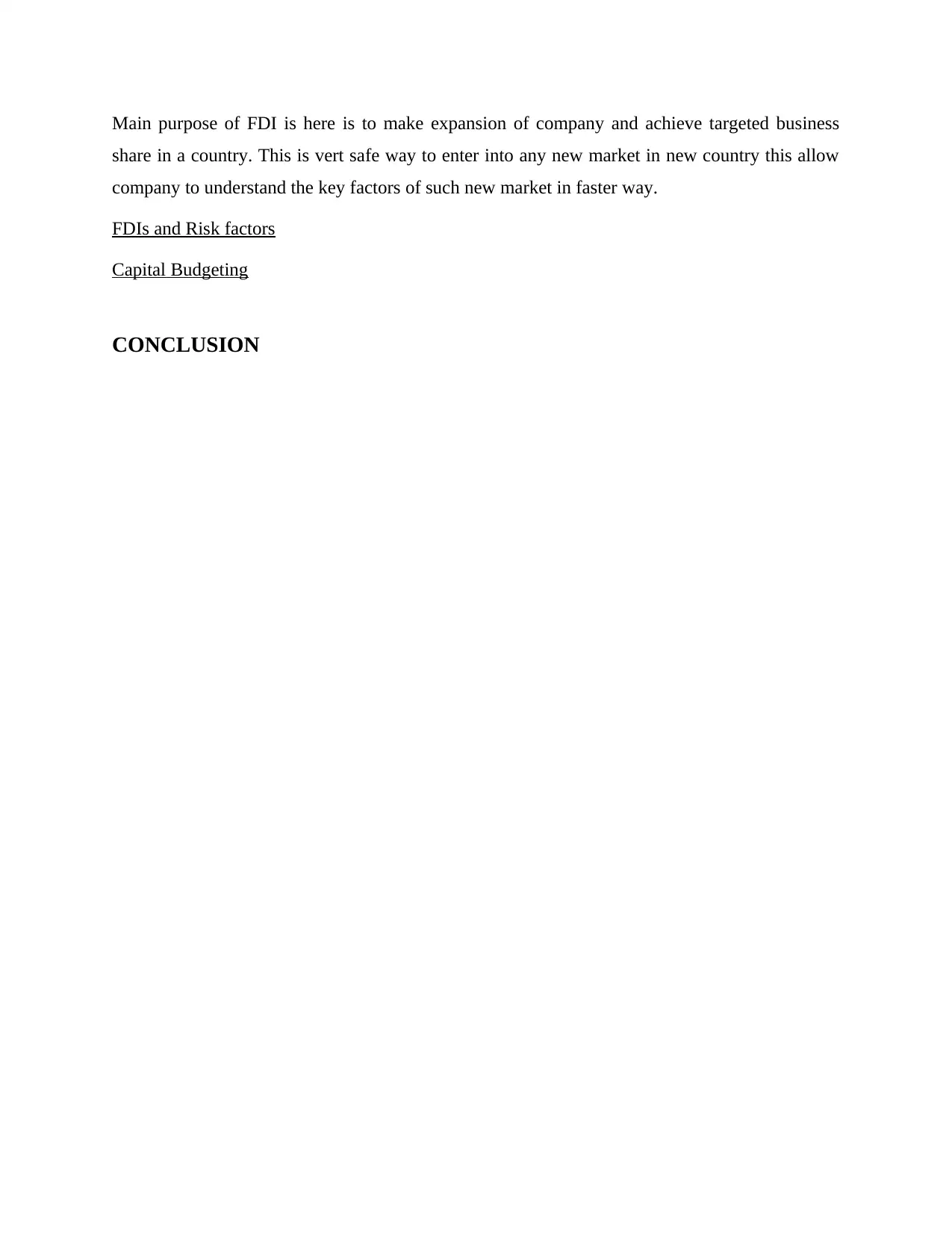
Main purpose of FDI is here is to make expansion of company and achieve targeted business
share in a country. This is vert safe way to enter into any new market in new country this allow
company to understand the key factors of such new market in faster way.
FDIs and Risk factors
Capital Budgeting
CONCLUSION
share in a country. This is vert safe way to enter into any new market in new country this allow
company to understand the key factors of such new market in faster way.
FDIs and Risk factors
Capital Budgeting
CONCLUSION
1 out of 5
Related Documents
Your All-in-One AI-Powered Toolkit for Academic Success.
+13062052269
info@desklib.com
Available 24*7 on WhatsApp / Email
![[object Object]](/_next/static/media/star-bottom.7253800d.svg)
Unlock your academic potential
© 2024 | Zucol Services PVT LTD | All rights reserved.





